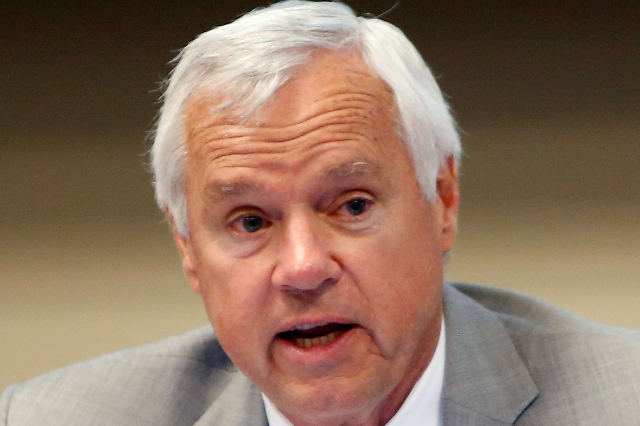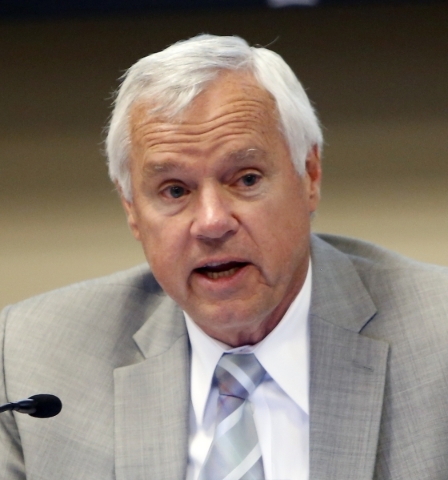Consultant clears higher ed chancellor of mishandling critical report
A hired consultant has cleared Nevada higher education Chancellor Dan Klaich of any wrongdoing in his handling of a report critical of his agency.
An investigation initiated by the Nevada System of Higher Education discovered that Klaich had told hired researchers he feared losing his job if their 2014 report on community college governance became public. A researcher also told an investigator that he had softened critical language in a rewrite of the report requested by Klaich.
But that didn't violate any ethical standards in higher education, concluded the investigation, which was released Monday and will be discussed by the Board of Regents at its Sept. 10-11 meeting. Neither did Klaich's decision to withhold from the public the 2014 draft report and its rewrite, often referred to as the McGuiness report, a reference to researcher Aims McGuiness of the National Center for Higher Education Management Systems.
The Las Vegas Review-Journal exposed the issue in June, reporting that emails between higher education system officials obtained through the state's public records law showed officials had buried the 2014 report intended for a legislative committee that was considering radically changing higher education governance. System insiders believed the report would be used to "bludgeon" the agency if it became public.
Emails also show that researchers ultimately rewrote the report, offering to eliminate it entirely if need be. In the end, the report was kept internal.
The system has stressed that the report was rewritten not because it gave staff "heartburn", as Klaich told researchers, but because it got facts wrong. The system also has emphasized that while the report was not shared, most of its recommendations were adopted.
The investigation — estimated at $50,000 — was done by San Francisco-based attorney Stephen Hirschfeld, whose firm has an office in Reno. He bases his conclusions on the assumption that the report in question was not intended for an interim legislative committee on community college governance.
That's contradicted in emails written by Klaich.
Intent and Timing
After Klaich's staff panicked about the report, suggesting that it shed a negative light on the Board of Regents, Klaich assured his staff a rewrite was underway.
In an email, dated June 3, 2014, Klaich told his staff that researchers "know the final committee meeting is June 17 and we need it (the rewrite) in time for that meeting."
That was the meeting where an interim legislative committee was to decide whether or not it wanted to break up the higher education system and pull the community colleges out of the regents' purview. In the end, things stayed as they were.
Hirschfeld's investigation — which consisted of interviews with the consultant in question and Klaich's staff — notes that: "All of the witnesses I spoke to credibly said that neither Klaich nor anyone else ever told them that there was any intention to distribute the McGuiness report to Committee."
Hirschfeld is a founding attorney at Hirschfeld Kraemer, which represents more than 100 colleges and universities by conducting independent investigations into employees and defending institutions, according to its website.
The investigation also blames timing for why legislators didn't see the report. The investigation concluded the rewrite was not done early enough to be presented before the legislative committee's' final June 17, 2014 meeting. The investigation found that meeting wasn't the right forum for the rewrite to be presented because it "was a work session where no testimony would be taken." In addition, legislative recommendations on higher education governance had already been made at that point, the investigation noted.
But Klaich's email indicates he and his staff had wanted the rewritten report from the National Center for Higher Education Management Systems specifically for the June 17, 2014 meeting.
Additionally, minutes from the meeting indicate more than 10 people did testify, including Klaich. While legislative recommendations had been submitted to lawmakers, the vote on what to do happened at that meeting.
Job Concerns
The seven people interviewed for the investigation said Klaich overreacted to the 2014 report, but Hirschfeld found Klaich hadn't pressured researchers and he encouraged the chancellor to continue to speak frankly. Those interviewed include three Nevada System of Higher Education staff members, College of Southern Nevada President Michael Richards, two officials with the National Center for Higher Education Management Systems and Klaich.
In one email uncovered in the investigation, Klaich told the National Center for Higher Education Management Systems and his own staff, "Without trying to be melodramatic, I could see this report costing me my job. It would certainly undermine my standing and credibility with the presidents and the Regents."
Hirschfeld did find researchers softened language in the report of their own volition.
The 2014 report, he found, was not quashed as Klaich "had no obligation, legal or otherwise" to release the critical draft report or its rewrite. Hirschfeld also pointed out that Klaich, in a 2014 email, offered to present the rewritten report to the Board of Regents.
"Klaich commissioned the report for his own internal purposes, and he had the right to decide whether or not he wanted to voluntarily disclose it to the public," according to the investigation.
Hirschfeld wrote it was his opinion that Klaich did not "violate any ethical or governance standards in higher education."
Contact Bethany Barnes at bbarnes@reviewjournal.com or 702-477-3861. Find her on Twitter: @betsbarnes.


















